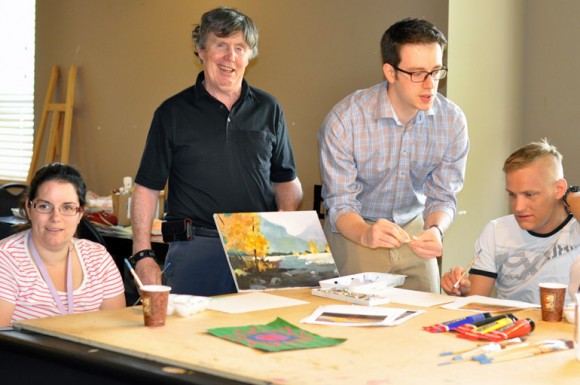
UBC Okanagan medical student Maksim Parfyonov, second from right, leads the weekly art class with Connect residents Amadee Hollowink, Glen O’Connor, and Matthew McKay.
New idea tackles depression and social isolation while creating useable art work
Second-year medical student Maksim Parfyonov has always had a keen interest in neuroscience. And art. When he was offered the chance to work with CONNECT as part of his Southern Medical Program studies at UBC’s Okanagan campus, it seemed like the perfect fit.
Parfyonov began his work with CONNECT, a residential rehabilitation program for people with acquired brain injury, in September as part of the MD curriculum’s Doctor, Patient, and Society course.
The invaluable learning opportunity has turned into weekly art lessons for CONNECT residents that will culminate in a public art show in Lake Country next month.
“I visited a weekly support group run by a psychologist, where I discovered that many of the residents struggle with depression,” says Parfyonov. “Social isolation is one of the contributing factors, as residents rarely interact with each other outside of meal times.”
For the first few weeks, the young student focused primarily on getting to know the residents and staff at CONNECT. Through his weekly visits, he enjoyed spending time with the residents and was able to develop a deeper understanding of the challenges often faced during their recovery.
Parfyonov established a weekly art workshop where residents could work on their creative projects in a club-like, social atmosphere. Parfyonov loved art, taking lessons throughout high school. However, he had to set aside his artistic passion during his medical studies. The weekly art workshops at CONNECT seemed liked a natural fit for him to get back into painting and at the same time assist the residents with their recovery.
With the added bonus of having a lot more art on the walls in the building, CONNECT occupational therapist and independence coach Brian Hall says he noticed a groundswell of excitement prior to the art classes. The class size has grown in numbers each week, and some residents, those he had no idea had an interest or aptitude in art, are involved in the sessions.
“Along with a few key people becoming very engaged, some mutual respect has been gained by residents seeing other residents create meaningful art,” says Hall, appreciating that Parfyonov brings the art classes to the residents. “I think people like to have the opportunity to be creatively engaged; we take people to pottery but that isn’t always the best option for those who struggle with over stimulating environments or the logistics of travelling.”
CONNECT operates specialized residential environments for people living with brain injury. Whether long-term or transitional, all programs address the physical, cognitive, emotional, and behavioural needs of the residents. The Lake Country condominium contains six homes, and each has seven private bedrooms, a kitchen, dining and living rooms.
Artwork created during the weekly workshops with Parfyonov will be showcased as an art exhibition from May 4 to 8 at the Lake Country Art Gallery’s Art House, 10356A Bottom Wood Lake Rd. A “meet the artists” event with refreshments will be held on May 4 at 2 p.m. The exhibition is supported by the Rachael Bagnall Arts in Medicine grant.
The goal of the exhibition says Hall is to help the community better understand people living with brain injuries.
“I hope the residents will feel a sense of pride from seeing their work on display,” says Parfyonov, “and they acknowledge their accomplishments in the face of adversity.”
—30—
 BC boosts milk production
BC boosts milk production Baby lives after stroller hit
Baby lives after stroller hit U.S. authorities find body
U.S. authorities find body UN workers charged
UN workers charged  Trudeau in Saskatoon
Trudeau in Saskatoon  Doctors protest tax change
Doctors protest tax change $620 million for Ukraine
$620 million for Ukraine  5 die crossing channel
5 die crossing channel Jury finds railway at fault
Jury finds railway at fault  Tourism operators struggle
Tourism operators struggle  Nude Beverages sells line
Nude Beverages sells line Wealth gap widening
Wealth gap widening Leafs even series
Leafs even series Cristall gets pro look
Cristall gets pro look Warriors even series in OT
Warriors even series in OT Hozier surprised by #1
Hozier surprised by #1 Trainor to replace Perry?
Trainor to replace Perry? Swift breaks Spotify record
Swift breaks Spotify record



